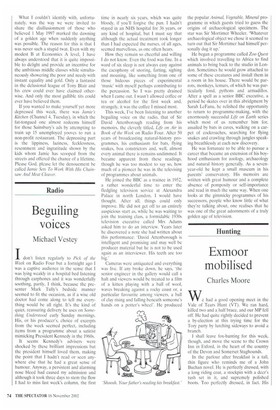Beguiling voices
Michael Vestey
Idon't listen regularly to Pick of the Week on Radio Four but a fortnight ago I was a captive audience in the sense that I was lying weakly in a hospital bed listening through earphones and it was wonderfully soothing, partly. I think, because the presenter Mark Tully's bedside manner seemed to fit the occasion, as if a wise old doctor had come along to tell me everything would be all right. It's the kind of quiet, reassuring delivery he uses on Something Understood early Sunday mornings. His, or his producer's, choice of excerpts from the week seemed perfect, including items from a programme about a satirist mimicking President Kennedy in the 1960s.
It seems Kennedy's advisers were shocked by these brilliant impressions but the president himself loved them, making the point that I hadn't read or seen anywhere else that he had a great sense of humour. Anyway, a persistent and alarming nose bleed had caused my admission and although it took three days to stem the flow I had to miss last week's column, the first time in nearly six years, which was quite bloody, if you'll forgive the pun. I hadn't stayed in an NHS hospital for 36 years, or any kind of hospital, but I must say that although the actual treatment took longer than I had expected the nurses, of all ages, seemed marvellous, as one often hears.
How they remain so cheerful and willing I do not know. Even the food was fine. In a ward of six sleep is not always easy against the cacophony of snoring, farting, sighing and moaning, like something from one of those hideous pieces of experimental 'music' with myself perhaps contributing to the percussion. So I was pretty drained when I came out. I wasn't allowed coffee or tea or alcohol for the first week and, strangely, it was the coffee I missed most.
This week, I've been listening to another beguiling voice on the radio, that of Sir David Attenborough reading from his memoirs, the cleverly titled, Life on Air in Book of the Week on Radio Four. After 50 years of broadcasting natural-history programmes, his enthusiasm for bats, flying snakes, boa constrictors and, well, almost every animal there is remains undimmed. It became apparent from these readings, though he was too modest to say so, how much of a pioneer he was in the televising of programmes about animals.
He joined the BBC as a trainee in 1952, a rather wonderful time to enter the fledgling television service at Alexandra Palace in north London, I would have thought. After all, things could only improve. He did not get off to an entirely auspicious start as, while he was waiting to join the training class, a formidable 1930s television executive called Mrs Adams asked him to do an interview. Years later he discovered a note she had written about this performance: 'David Attenborough is intelligent and promising and may well be producer material but he is not to be used again as an interviewer. His teeth are too big.'
Cameras were antiquated and everything was live. If any broke down, he says, 'the senior engineer in the gallery would call a halt and viewers would be treated to a film of a kitten playing with a ball of wool, waves breaking against a rocky coast or, a particular favourite among viewers, a ball of clay rising and falling beneath someone's hands on a potter's wheel'. He produced
the popular Animal, Vegetable, Mineral programme in which guests tried to guess the origins of archaeological specimens. The star was Sir Mortimer Wheeler. 'Whatever archaeological object we chose it seemed to turn out that Sir Mortimer had himself personally dug it up.'
He began a programme called Zoo Quest which involved travelling to Africa to find animals to bring back to the studio in London. Sometimes he would grow attached to some of these creatures and install them in a room in his house. There would be parrots, monkeys, lemurs, of which he was particularly fond, pythons and armadillos. After a spell as a senior BBC executive, a period he skates over in this abridgment by Sarah LeFanu, he relished the opportunity to return to programme-making, with the enormously successful Life on Earth series which most of us remember him for, assailed by bats in caves, walking on a carpet of cockroaches, searching for flying snakes and crawling through jungles speaking breathlessly at each new discovery.
He was fortunate to be able to pursue a career that became an extension of his boyhood enthusiasm for zoology, archaeology and natural history generally. As a sevenyear-old he kept a small museum in his parents' conservatory. His memoirs are written with great humour and a complete absence of pomposity or self-importance and read in much the same way. When one looks at the gimmicky programmes of his successors, people who know little of what they're talking about, one realises that he was one of the great adornments of a truly golden age of television.


























































































 Previous page
Previous page